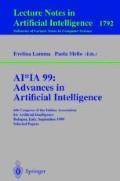Abstract
This paper focuses on a major step of machine learning, namely checking whether an example matches a candidate hypothesis. In relational learning, matching can be viewed as a Constraint Satisfaction Problem (CSP). The complexity of the task is analyzed in the Phase Transition framework, investigating the impact on the effectiveness of two relational learners: FOIL and G-NET.
The critical factors of complexity, and their critical values, are experimentally investigated on artificial problems. This leads to distinguish several kinds of learning domains, depending on whether the target concept lies in the “mushy” region or not. Interestingly, experiments done with FOIL and G-NET show that both learners tend to induce hypotheses generating matching problems located inside the phase transition region, even if the constructed target concept lies far outside. Moreover, target concepts constructed too close to the phase transition are hard and both learners fail. The paper offers an explanation for this fact, and proposes a classification of learning domains and their hardness.
Access this chapter
Tax calculation will be finalised at checkout
Purchases are for personal use only
Preview
Unable to display preview. Download preview PDF.
References
Anglano C., Giordana A., Lo Bello G., and Saitta L. (1997). “A Network Genetic Algorithm for Concept Learning”. In Proc. 7th Int. Conf. on Genetic Algorithms (East Lansing, MI), pp. 434–441.
Anglano C., Giordana A., Lo Bello G., and Saitta L. (1998). “An Experimental Evaluation of Coevolutive Concept Learning”. In Proc. 15th Int. Conf. on Machine Learning (Madison, WI), pp. 19–27.
Cheeseman P., Kanefsky B., and Taylor W.M. (1991). “Where the Really Hard Problems Are”. In Proc. 12th Int. Joint Conf on Artificial Intelligence (Sidney, Australia), pp. 331–337
Crawford J.M., and Auton L.D. (1996). “Experimental Results on the Crossover Point in Random 3-SAT”. Artificial Intelligence, 81, 31–58.
Freeman J.W. (1996). “Hard Random 3-SAT Problems and the Davis-Putnam Procedure”. Artificial Intelligence, 81, 183–198.
Gent I.P., and Walsh T. (1996). “The TSP Phase Transition”. Artificial Intelligence, 88, 349–358.
Giordana A., Neri F., Saitta L., and Botta M. (1998). “Integrating Multiple Learning Strategies in First Order Logics”. Machine Learning, 27, 209–240.
Giordana A., and Saitta L. (1998). “Phase Transition in Learning with FOL Languages”, TR 97-25, Dipartimento di Informatica, Università di Torino.
Giordana A., Saitta L., and Botta M. (1999). “An Experimental Study of Phase Transitions in Matching”, in Proc. 16th Int. Joint Conf. on Artificial Intelligence, (Stockholm, Sweden), pp. 1198–1203.
Holte R.C., Acker L.E., and Porter B.W. (1989). “Concept learning and the problem of small disjuncts”. In Proc. 11th Int. Joint Conf. On Artificial Intelligence (Detroit, MI), pp. 813–818.
Hogg T. (1996). “Refining the Phase Transition in Combinatorial Search”. Artificial Intelligence, 81, 127–154.
Hogg T., Huberman B.A., and Williams C.P. (Eds.) (1996). Artificial Intelligence, Special Issue on Frontiers in Problem Solving: Phase Transitions and Complexity, 81(1–2).
Prosser P. (1996). “An Empirical Study of Phase Transitions in Binary Constraint Satisfaction Problems”. Artificial Intelligence, 81, 81–110.
Quinlan R.J. (1990). “Learning Logical Definitions from Relations”, Machine Learning, 5, 239–266.
Sebag M., and Rouveirol C. (1997). “Tractable Induction and Classification in FOL”. In Proc. 15th Int. Joint Conf. on Artificial Intelligence (Nagoya, Japan), pp. 888–892.
Selman B., and Kirkpatrick S. (1996). “Critical Behavior in the Computational Cost of Satisfiability Testing”. Artificial Intelligence, 81, 273–296.
Smith B.M., and Dyer M.E. (1996). “Locating the Phase Transition in Binary Constraint Satisfaction Problems”. Artificial Intelligence, 81, 155–181.
Williams C.P., Hogg T. (1994). “Exploiting the Deep Structure of Constraint Problems”. Artificial Intelligence, 70, 73–117.
Zhang W., and Korf R.E. (1996). “A Study of Complexity Transition on the Asymmetric Travelling Salesman Problem”. Artificial Intelligence, 81, 223–239.
Author information
Authors and Affiliations
Editor information
Editors and Affiliations
Rights and permissions
Copyright information
© 2000 Springer-Verlag Berlin Heidelberg
About this paper
Cite this paper
Botta, M., Giordana, A., Saitta, L., Sebag, M. (2000). Relational Learning: Hard Problems and Phase Transitions. In: Lamma, E., Mello, P. (eds) AI*IA 99: Advances in Artificial Intelligence. AI*IA 1999. Lecture Notes in Computer Science(), vol 1792. Springer, Berlin, Heidelberg. https://doi.org/10.1007/3-540-46238-4_16
Download citation
DOI: https://doi.org/10.1007/3-540-46238-4_16
Published:
Publisher Name: Springer, Berlin, Heidelberg
Print ISBN: 978-3-540-67350-7
Online ISBN: 978-3-540-46238-5
eBook Packages: Springer Book Archive

